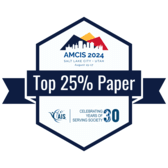Loading...
Paper Type
ERF
Abstract
This study examines to what extent current information systems (IS) research has investigated artificial intelligence (AI) applications to fight human trafficking, the theories and models employed to study these applications, the ethical concerns that these applications pose, and the possible technical and managerial solutions to address such concerns. This investigation will be conducted through a systematic literature review methodology and a semantic text similarity analysis. The results of our review will make significant contributions to IS researchers by synthesizing previous human trafficking studies and proposing an agenda and future directions for IS studies to make them more oriented toward studying information technologies that contribute to "a better world." This study will also help law enforcement authorities and organizations that develop and provide AI services by suggesting technical and managerial solutions that can minimize possible ethical concerns related to biases and discriminatory outcomes generated by AI to combat human trafficking.
Paper Number
1295
Recommended Citation
Guerra, Katia and Land, Anna, "Using AI to Fight Human Trafficking: Ethical Considerations" (2024). AMCIS 2024 Proceedings. 3.
https://aisel.aisnet.org/amcis2024/soc_inclusion/social_inclusion/3
Using AI to Fight Human Trafficking: Ethical Considerations
This study examines to what extent current information systems (IS) research has investigated artificial intelligence (AI) applications to fight human trafficking, the theories and models employed to study these applications, the ethical concerns that these applications pose, and the possible technical and managerial solutions to address such concerns. This investigation will be conducted through a systematic literature review methodology and a semantic text similarity analysis. The results of our review will make significant contributions to IS researchers by synthesizing previous human trafficking studies and proposing an agenda and future directions for IS studies to make them more oriented toward studying information technologies that contribute to "a better world." This study will also help law enforcement authorities and organizations that develop and provide AI services by suggesting technical and managerial solutions that can minimize possible ethical concerns related to biases and discriminatory outcomes generated by AI to combat human trafficking.
When commenting on articles, please be friendly, welcoming, respectful and abide by the AIS eLibrary Discussion Thread Code of Conduct posted here.





Comments
SIGSI